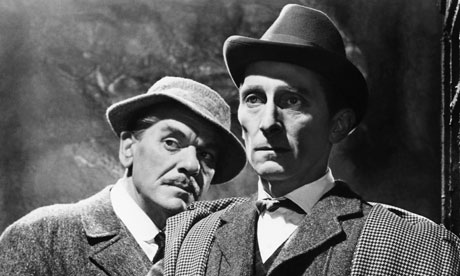Only by creating an enduring character can a writer entertain thoughts of a literary career
Robert McCrumThe Observer,
 ,
, Conan Doyle's Sherlock Holmes and Dr Watson, as played by Andre Morell and Peter Cushing in 1959. Photograph: Allstar/Cinetext/Hammer Film
Despite the received wisdom of the book trade, writers don't have careers in the conventional sense. Each book emerges from a private imaginative landscape. But that's not a career, more a succession of leaps in the dark.
And yet authorship has become so professionalised that the language of the HR department now describes the writer's life. This is misplaced and inappropriate. Ideally, the writer works only for him, or herself, on their own terms. They have no boss.
All the writer can do is put one book in front of the last, and go back to the empty page or vacant screen. At best, the life of the writer, properly understood, is a quest for clarity and understanding in which every fresh start feels like an outrageous gamble against impossible odds.
Everything about the transition, from the solitude of the creative process to the raucous traffic of the marketplace, is chancy and provisional. This is as true now as it was in Samuel Johnson's day, though the explosion of new outlets has given the determined wannabe a greater range of options.
Last week, I opened an email from a writer celebrating her good fortune. When Louise Voss, a graduate of Kingston University's creative writing programme, found the book she co-wrote with Mark Edwards, Catch Your Death, rejected by countless literary agents, she decided to publish it herself using a new Kindle-friendly service that allows writers to turn their manuscripts into digital books. When her work prospered online, Voss made the transition from e (electronic) to p (print). Harper Fiction offered her a four-book contract.
That, you might say, signals a great beginning – let's hope so – but it could just as easily be a humiliating conclusion. The market and the critics, and even Ms Voss herself, will decide. Either way, it's less a career move, more a spin on the wheel of fortune.
The Voss deal is instructive. If there is one good route up the south face of Mount Parnassus, it's the trilogy. Publishers love it if you succeed in this genre. In 2008, an unknown thriller writer, Tom Rob Smith, attracted a lot of attention with Child 44, which was shortlisted for the Costa first novel prize. He followed it up with The Secret Speech. The conclusion of this series, Agent 6, and the further adventures of Smith's protagonist, Leo Demidov, was released last week. For four years, then, Tom Rob Smith has had a career, courtesy of his hero.
McCrum's full story at The Observer
Footnote:
What a joy to be able to buy an actual copy of The Observer in London today instead of having to read it online from the other side of the world.Flying to rural France today. Au revoir London.
And yet authorship has become so professionalised that the language of the HR department now describes the writer's life. This is misplaced and inappropriate. Ideally, the writer works only for him, or herself, on their own terms. They have no boss.
All the writer can do is put one book in front of the last, and go back to the empty page or vacant screen. At best, the life of the writer, properly understood, is a quest for clarity and understanding in which every fresh start feels like an outrageous gamble against impossible odds.
Everything about the transition, from the solitude of the creative process to the raucous traffic of the marketplace, is chancy and provisional. This is as true now as it was in Samuel Johnson's day, though the explosion of new outlets has given the determined wannabe a greater range of options.
Last week, I opened an email from a writer celebrating her good fortune. When Louise Voss, a graduate of Kingston University's creative writing programme, found the book she co-wrote with Mark Edwards, Catch Your Death, rejected by countless literary agents, she decided to publish it herself using a new Kindle-friendly service that allows writers to turn their manuscripts into digital books. When her work prospered online, Voss made the transition from e (electronic) to p (print). Harper Fiction offered her a four-book contract.
That, you might say, signals a great beginning – let's hope so – but it could just as easily be a humiliating conclusion. The market and the critics, and even Ms Voss herself, will decide. Either way, it's less a career move, more a spin on the wheel of fortune.
The Voss deal is instructive. If there is one good route up the south face of Mount Parnassus, it's the trilogy. Publishers love it if you succeed in this genre. In 2008, an unknown thriller writer, Tom Rob Smith, attracted a lot of attention with Child 44, which was shortlisted for the Costa first novel prize. He followed it up with The Secret Speech. The conclusion of this series, Agent 6, and the further adventures of Smith's protagonist, Leo Demidov, was released last week. For four years, then, Tom Rob Smith has had a career, courtesy of his hero.
McCrum's full story at The Observer
Footnote:
What a joy to be able to buy an actual copy of The Observer in London today instead of having to read it online from the other side of the world.Flying to rural France today. Au revoir London.
No comments:
Post a Comment